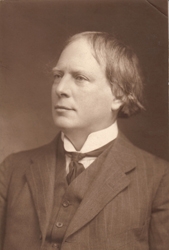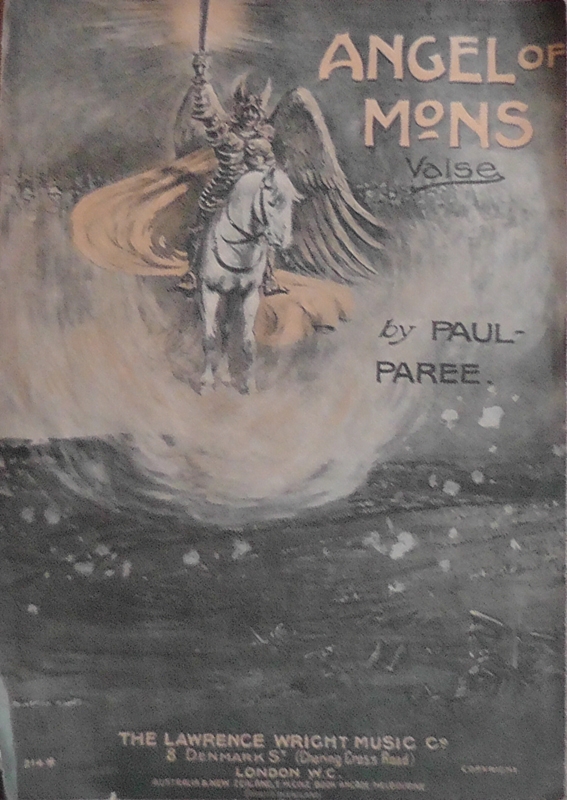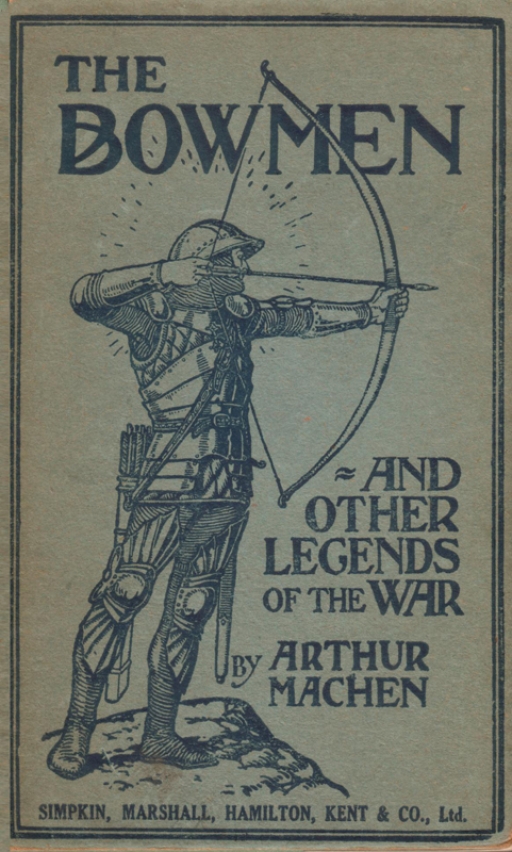Rosalie Parker, publicity officer of The Friends of Arthur Machen, explains how the First World War myth of the Angels of Mons grew out of a fictional story by the Welsh writer and his regret that so many came to believe it.
” . . It was as if I had touched the button and set in action a terrific, complicated mechanism of rumours that pretended to be sworn truth, of gossip that posed as evidence, of wild tarradiddles that good men most firmly believed.’ (Arthur Machen, T.P.’s Weekly, 27th November 1915)
The Angels of Mons is one of the abiding legends of World War One. They were the heavenly multitude seen by British soldiers to interpose themselves between the advancing German Army and the retreating British Expeditionary Force during the Battle of Mons, late August 1914.
What is less well known is that the legend, or perhaps more accurately, myth, began as a piece of short fiction called ‘The Bowmen’, written by Welsh writer Arthur Machen (1863-1947).

Welsh writer and journalist Arthur Machen. Picture courtesy Tartarus Press.
Machen was best known for his 1894 novella ‘The Great God Pan’, a sophisticated and shocking tale of horror in its day.
‘The Bowmen’ was published by the London Evening News on the 29th September 1914, and it was not made clear that it was a piece of fiction.
Machen, a staff journalist on the newspaper, contributed patriotic reportage from the home front throughout World War One.
Machen’s story tells of a fierce rearguard action based on the retreat from Mons. During the fighting, a British soldier recalls dinner plates used in a London restaurant decorated with St George and the motto Adsit Anglis Sanctus Georgius (may St George be a present help to the English).
The soldier sees a “long line of shapes … that resemble archers.” The ghostly Agincourt bowmen “let fly a cloud of arrows at the advancing Germans, who fall dead in their thousands.”
Machen later recalled: “I looked out of my window one Sunday morning towards the end of August 1914, and saw some newspaper bills in front of the little shop over the way, and saw that the night had come. . . . I have forgotten the detail of the newspaper account of (the retreat); but I remember it was a tale to make the heart sink, almost to deep despair.
“It told of the British army in full retreat, nay, in headlong, desperate retreat, on Paris. . . . The correspondent rather pictured an army broken to fragments scattered abroad in confusion.
“It was hardly an army any more; it was a mob of shattered men. . . . And I suppose that in the first place it was to comfort myself that I thought of the story of ‘The Bowmen’, and wrote it in the early days of September.”
Regret
Machen regretted that the Angels of Mons myth had grown up around his work of fiction and pointed out that the word ‘angels’ had not appeared in the story.

He blamed religious bodies for making the most of his “unremarkable” tale, and battlefield hallucinations for the plethora of retrospective accounts of angels that appeared in the press throughout 1915.
On 24th April 1915, Light Magazine argued: “Whether Mr Machen’s story was pure invention or not, it was certainly stated in some quarters that a curious phenomenon had been witnessed by several officers and men in connection with the retreat from Mons.
Strange cloud
“It took the form of a strange cloud interposed between the Germans and the British. Other wonders were heard or seen in connection with this cloud which, it seems, had the effect of protecting the British against the overwhelming hordes of the enemy.”
In December 1915, The Society for Psychical Research published a report which concluded that many of the stories of visions on the battlefield were founded on mere rumour, no first-hand testimony was obtainable and detailed evidence was lacking . . .
It seems that Arthur Machen’s story gave life to a powerfully reassuring fantasy – that God’s angels would, in extremis, intercede on the Allies behalf. It was a myth that many British people, in the early years of the War, wanted, or needed, to believe in.
Picture credits: Tartarus Press
